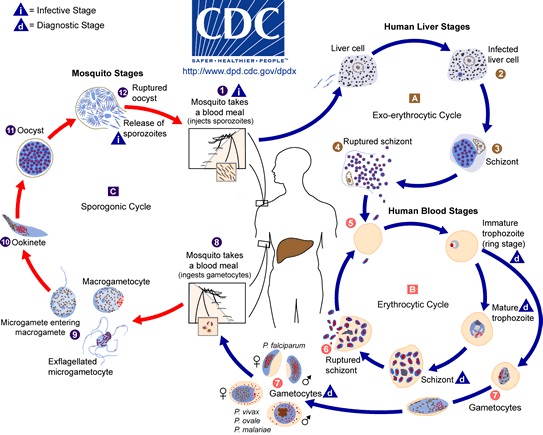QUESTION
Why can the malaria parasite be transmitted from mosquito to human, but not from human to human (via blood)?
ANSWER
This is a very good question, and actually, malaria can be transmitted via human blood directly to another person, but this occurs relatively rarely!
It has to do with the life cycle of the malaria parasite. When a mosquito bites a human host, it injects sporozoites from its salivary glands into the blood. This life stage first migrates to the liver, where it undergoes a cycle of multiplication, before entering the blood stream. Here, in the so-called “erythrocytic” portion of the life cycle, the parasite reproduces a series of times in red blood blood, before finally forming gametocytes, which are required to be ingested by a mosquito vector during another blood meal for the life cycle to be continued. As such, when blood is passed between people, they would have to pass infected red blood cells, and not gametocytes (which are not infective to humans, only to mosquitoes) in order for the other person to become infected.
As such, when a person who is infected with malaria donates blood, there is a chance that they might pass on some red blood cells which are infected with mature trophozoites or schizonts; these could then go on to infect more red blood cells in the person who received the blood. However, in most countries, blood is screened for malaria, and in fact, in many places, people who might have been exposed to malaria are not allowed to donate whole blood, only plasma (in which the red blood cells have been removed, and therefore there is no risk of transmission). Given the high levels of malaria prevalence in some endemic countries, however, preventing people from donating blood who are positive for malaria may result in too little blood being collected; in these cases, other strategies, such as treating donors or closely monitoring patients post-transfusion, may prove to be a better strategy.

Leave a Reply
You must be logged in to post a comment.